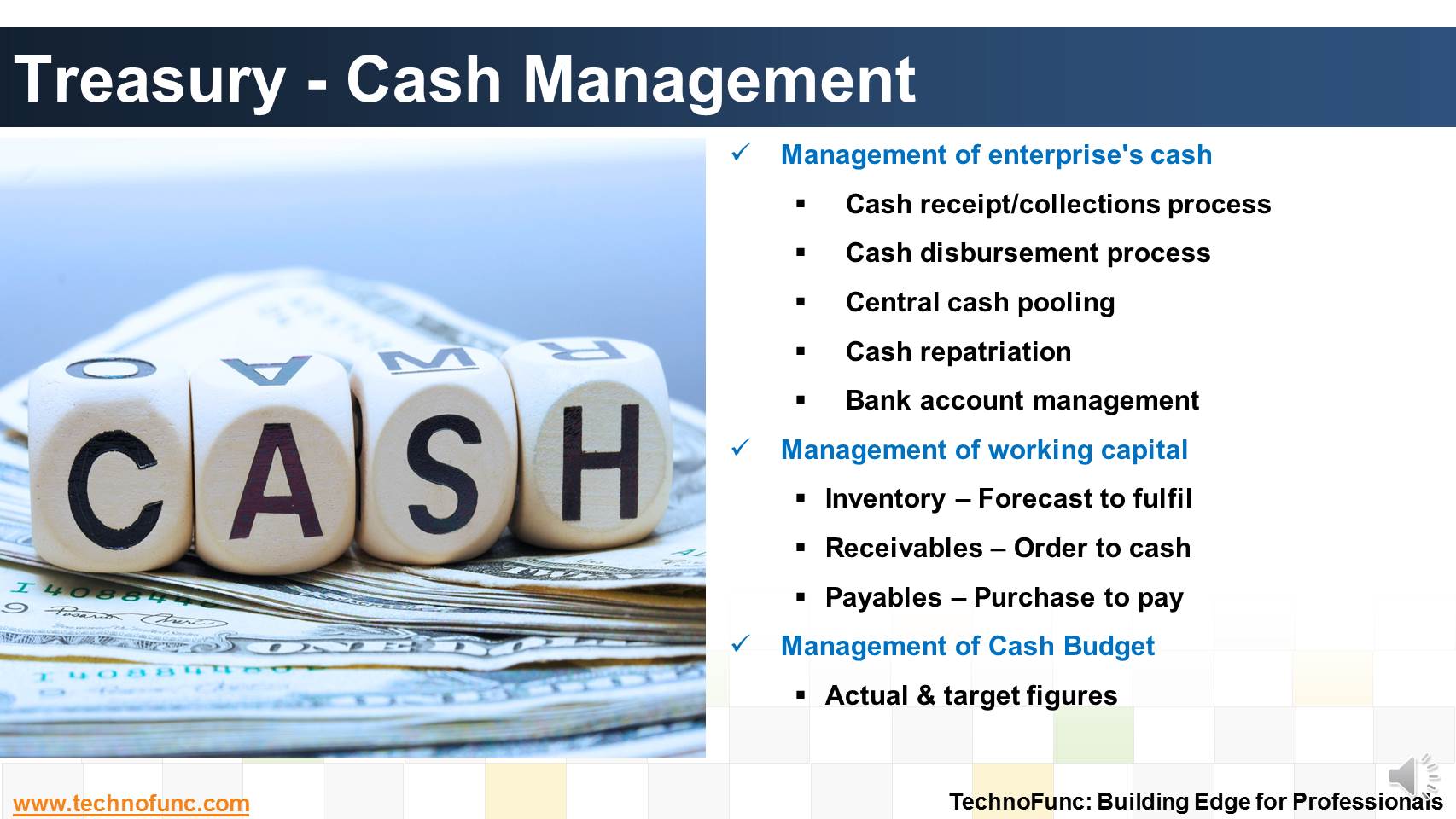- Home
- Business Processes
- Industry Knowledge
- Aerospace Industry
- Automotive Industry
- Banking Domain
- BFSI Industry
- Consumer/ FMCG Industry
- Chemicals Industry
- Engineering & Construction
- Energy Industry
- Education Domain
- Finance Domain
- Hospitality Domain
- Healthcare Industry
- Insurance Domain
- Retail Industry
- Travel and Tourism Domain
- Telecom Industry
- Leadership Skills
- eLearning
- Home
- Functional
- Cash Management
- Treasury - Cash Management
Treasury - Cash Management
The Cash Management component ensures that the enterprise has sufficient liquidity for payments that are due and to monitor payment flows. Learn how treasury plays an important role in cash management for the enterprise.
The Cash Management component ensures that the enterprise has sufficient liquidity for payments that are due and to monitor payment flows.
The cash position and liquidity forecast functions are used to track the movements on the various accounts.
It is very important to correctly assess local and international liquidity needs and cash availability.
Management of enterprise's cash
- Treasury function manages liquidity by accessing and using data from multiple systems and processes.
- With centralized cash management at enterprise level there is greater transparency into global cash flow that helps in optimizing Cash receipt and disbursement process to improve efficiencies
- Central in-house cash control reduces dependency on external funding and improves processes for transferring cash to operations worldwide.
- Position transparency and liquidity management is achieved through position management like Central cash pooling
- Cash and capital repatriation is also managed under treasury function.
Management of working capital
- Inventory – Forecast to fulfil
- Analyze sales forecast processes and evaluate production and material execution plans
- Receivables – Order to cash
- Enterprise wide visibility and consistency throughout the order to cash process by generating value from credit and collections
- Payables – Purchase to pay
- Vendor payments management and analyze company expenditure and spending patterns
Cash Budget Management
- The objective of the Cash Budget Management component is to monitor and secure liquidity in the medium to long term.
- It delivers the actual and target figures for reviewing plans, analyzing deviations and as a basis for future planning.

-
Bank Reconciliation is a PROCESS to Validate the bank balance in the general ledger With Bank Statement. Learn the bank recon process.
-
Introduction to Bank Reconciliation Process
These set of articles provide a brief introduction to Bank Reconciliation Process. This topic not only discusses the meaning of bank reconciliation process but also discusses how this process in handled in new age ERPs and Automated Reconciliation Systems.
-
In manual clearing, Bank statement details are to be matched manually considering certain rules. Learn the steps involved in manual clearing of bank transactions.
-
The Cash Clearing process enables you to track amounts that have actually cleared your bank. Till reconciliation happens the amounts are parked in 'Cash Clearing Account'.
-
The topic for this lesson is "Introduction to Cash Management Process". We start with the learning objectives for building requisite functional expertise in cash management process.
-
What is Invoice to Cash Process
In this article, we will explore the business process area known as; Invoice to Cash; Also known as I2C. Learning objectives for this lesson are: Meaning of Invoice to Cash Process; Sub Processes under Invoice to Cash; Process Flow for Invoice to Cash; Key Transactions Fields; Key Setups/Master Data Requirements.
-
The Cash Management component ensures that the enterprise has sufficient liquidity for payments that are due and to monitor payment flows. Learn how treasury plays an important role in cash management for the enterprise.
-
Before we dive into cash management, let us fist understand what we mean by cash and what constitutes cash in context of cash management process.
-
Unravel the mystery behind clearing. Why we use clearing accounts. Find the relevance of word "Clearing" in business context.
-
How the inflow and outflow of cash is linked to the operating cycles of the business? Learn the cash management process in an enterprize and it's key components.
Related Links
You May Also Like
-
Treasury Management - Functions
Treasury management has become an specialized function. Treasury function helps in managing the Risk-return profile as well as the tax-efficiency of investment instruments. In larger firms, it may also include trading in bonds, currencies and financial derivatives. Learn about the various tasks, activities and imperatives, undertaken by treasuries in in today's context.
-
Although there is no straight forward answer to the question, how to best organize a treasury function, this article provides an generic view of the way large MNCs creates departments or sub-functions within the treasury function.
-
The Cash Management component ensures that the enterprise has sufficient liquidity for payments that are due and to monitor payment flows. Learn how treasury plays an important role in cash management for the enterprise.
-
The objective of funding Management is to implement strategies that lead to the best borrowing rates and lower investment costs. Learn how treasury aids in loans and investment management functions.
-
The terms Treasury Management and Cash Management are sometimes used interchangeably, while, in fact, the scope of treasury management is larger and includes funding and investment activities as well. Learn all about Treasury Management here!
-
Treasury Management - Benefits
Effectively using treasury management with cash management and trade finance products brings tangible benefits to both corporates and financial institutions. Let us discuss some tangible benefits of treasury function.
-
The objective of Financial risk management is to protect assets and cash flows from any risk. Treasury function works to accurately assess financial risks by identifying financial exposures including foreign exchange, interest rate, credit, commodity and other enterprise risks. Learn about the various risks that are managed by treasury.
-
Treasury has increasingly become a strategic business partner across all areas of the business, adding value to the operating divisions of the company. Managing activities that were traditionally carried out within the general finance function. Learn about the drivers for this change.
-
Technology has enabled the treasury function by providing various solutions to manage it's complicated tasks. This article explains various types of treasury management systems available in the market.
Explore Our Free Training Articles or
Sign Up to Start With Our eLearning Courses

About Us
Learning
© 2023 TechnoFunc, All Rights Reserved



















